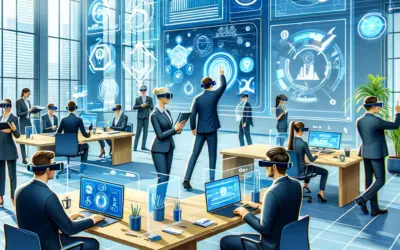Understanding the Metaverse: A Guide for Businesses
The metaverse, a term coined by Neal Stephenson in his 1992 science fiction novel «Snow Crash,» refers to a virtual universe comprised of interconnected, immersive digital environments. While the concept was once confined to the pages of books and the imaginations of futurists, it has now become a tangible reality that businesses must pay attention to.
The Rise of the Metaverse
In recent years, advancements in technology have made the metaverse more accessible than ever before. With the widespread adoption of virtual reality (VR) and augmented reality (AR) devices, users can now enter digital spaces that simulate real-world environments or offer entirely new experiences. This shift has opened up a world of opportunities for businesses looking to connect with customers in innovative ways.
Opportunities for Businesses in the Metaverse
The metaverse presents a myriad of opportunities for businesses across various industries. One of the most significant advantages is the ability to create immersive brand experiences. By designing virtual environments that align with their brand identity, businesses can engage with customers on a whole new level. Whether it’s a virtual store where customers can browse and purchase products or a virtual event that brings people together from all corners of the world, the metaverse offers boundless potential for building brand loyalty and driving sales.
Another opportunity lies in the realm of virtual advertising. With traditional forms of digital advertising becoming saturated and less effective, businesses are turning to the metaverse as a new platform to reach their target audience. In this virtual universe, advertisers can seamlessly integrate their brand into the digital environment in a way that feels organic and non-intrusive. By taking advantage of the metaverse’s interactive nature, businesses can create memorable experiences that leave a lasting impression on consumers.
Challenges and Considerations
While the metaverse offers exciting possibilities, businesses must also be mindful of the challenges and considerations that come with venturing into this space. As the technology is still relatively new, there are not yet clear-cut rules and standards for operating in virtual environments. This lack of regulation can present risks, such as potential data breaches or intellectual property infringement. It is crucial for businesses to prioritize cybersecurity measures and ensure that they have proper legal protections in place.
Additionally, businesses must carefully consider their target audience when deciding to enter the metaverse. While younger generations tend to be more comfortable in virtual spaces, older demographics may have less familiarity and willingness to engage. Understanding the demographic makeup of your customer base and their willingness to adopt new technologies is essential for determining the feasibility and potential ROI of investing in the metaverse.
In conclusion, the metaverse is no longer just a futuristic concept. It has become a reality that businesses cannot afford to ignore. By embracing the opportunities it presents and navigating the challenges with caution, businesses can position themselves at the forefront of this emerging digital frontier. The key to success lies in understanding the metaverse, its impact on the business landscape, and how to leverage it to drive growth and innovation.
The Metaverse: A Game-Changer for Business Operations
The concept of the metaverse has been buzzing in the tech world for quite some time now, and it’s not hard to understand why. The metaverse, referring to a virtual reality space that is collectively created and shared by users, has the potential to revolutionize the way businesses operate. It offers a new realm of possibilities for enhanced collaboration, customer engagement, and even productivity.
One of the key ways in which the metaverse can be a game-changer for business operations is through immersive virtual meetings. Instead of the traditional video conferencing tools, imagine stepping into a virtual space where you can interact with your colleagues and clients as if you were all physically present in the same room. This not only eliminates the distance barrier but also allows for a more engaging and productive meeting experience.
Enhanced Collaboration
In the metaverse, businesses can create virtual workspaces where employees can collaborate on projects in real-time. This opens up opportunities for seamless communication and brainstorming sessions, regardless of geographical locations. With the ability to share and edit documents in a shared virtual space, teams can work together more efficiently and effectively, leading to improved productivity and innovation.
Customer Engagement
Another way the metaverse is a game-changer is in terms of customer engagement. Businesses can create immersive virtual environments to showcase their products or services, allowing customers to interact with them in a whole new way. Imagine a virtual showroom where potential customers can explore and experience products before making a purchase decision. This not only enhances the customer experience but also provides businesses with valuable insights into customer preferences and behavior.
Furthermore, the metaverse opens up new avenues for marketing and advertising. Brands can create virtual events or experiences to engage with their target audience, providing a unique and unforgettable brand experience. This level of interactivity and personalization can significantly impact customer loyalty and brand recognition.
In conclusion, the metaverse has the potential to be a game-changer for business operations. From immersive virtual meetings to enhanced collaboration and customer engagement, the possibilities are endless. As the technology continues to evolve, businesses need to start exploring how they can leverage the metaverse to stay competitive in this digital age.
Exploring Opportunities in the Metaverse for Businesses
The metaverse has emerged as an exciting new frontier, offering limitless possibilities for businesses to connect with their customers in immersive and interactive ways. With advancements in technology, the metaverse is no longer just a concept in science fiction, but a tangible reality. As businesses seek innovative ways to engage with their target audience in a digital world, the metaverse presents a wealth of opportunities that cannot be ignored.
One of the key benefits of the metaverse for businesses is the ability to create unique brand experiences. Through virtual reality (VR) and augmented reality (AR) technologies, companies can transport their customers into a virtual space where they can interact with products and services in a whole new way. Whether it’s trying on virtual clothes before making a purchase or exploring a virtual showroom to customize a car, the metaverse enables businesses to provide immersive experiences that are not possible in the physical world.
Enhanced collaboration and productivity
In addition to customer engagement, the metaverse also offers opportunities for businesses to enhance collaboration and productivity within their organizations. Virtual meeting spaces provide a more immersive and interactive environment for team members to connect, regardless of their geographic location. With the ability to share and manipulate virtual objects in real-time, businesses can streamline workflows and speed up decision-making processes, leading to increased productivity and efficiency.
Furthermore, the metaverse can serve as a platform for businesses to showcase their products and services to a global audience. By leveraging social VR platforms, companies can host virtual events, conferences, and product launches, reaching a wider audience than ever before. These virtual gatherings not only allow businesses to generate buzz and drive sales but also provide a cost-effective alternative to traditional physical events.
Challenges and considerations
While the metaverse presents exciting opportunities for businesses, it is not without its challenges and considerations. One of the main concerns is the need to ensure data security and privacy in virtual environments. As businesses collect and process customer data within the metaverse, it becomes crucial to implement robust security measures to protect sensitive information.
Another challenge is the accessibility and inclusion of all users in the metaverse. As businesses design virtual experiences, it is important to consider factors such as usability for individuals with disabilities, internet connectivity requirements, and affordability of VR/AR devices. Ensuring equal access and opportunities for all users will be key to maximizing the potential of the metaverse for businesses.
In conclusion, the metaverse opens up a world of possibilities for businesses to connect with their customers and transform the way they operate. By leveraging VR and AR technologies, businesses can create immersive brand experiences, enhance collaboration, and reach a global audience. However, it is essential to address challenges such as data security and accessibility to unlock the true potential of the metaverse. As technology continues to evolve, businesses that embrace the metaverse will be at the forefront of innovation and future success.
How the Metaverse is Revolutionizing Business Collaboration
Introduction
The metaverse is a rapidly evolving concept that is reshaping the way businesses collaborate and interact. It refers to a virtual reality space where users can engage with digital environments and other users in real-time. While the metaverse is often associated with gaming and entertainment, its potential impact on business collaboration cannot be overstated. In this article, we will explore how the metaverse is revolutionizing business collaboration and discuss the key advantages it offers over traditional collaboration methods.
Enhanced Virtual Meetings and Communication
One of the most significant ways the metaverse is revolutionizing business collaboration is through enhanced virtual meetings and communication. With the metaverse, teams can gather in virtual spaces that simulate real-world meeting rooms, enabling remote participants to feel as if they are physically present. This immersive experience fosters a stronger sense of connection and engagement, leading to improved collaboration and productivity.
Moreover, the metaverse offers advanced communication tools that enhance collaboration during virtual meetings. Users can utilize voice and gesture-based interactions, making communication more natural and intuitive. This allows for better real-time collaboration, brainstorming sessions, and decision-making processes, as participants can easily share ideas and provide immediate feedback.
Seamless Global Collaboration and Accessibility
Another key advantage of the metaverse in business collaboration is its ability to facilitate seamless global collaboration. Traditional collaboration methods often face geographical constraints, making it challenging to coordinate with teams located in different time zones or remote locations. The metaverse transcends these limitations by providing a virtual space accessible to anyone, anywhere, and at any time.
By leveraging the metaverse, businesses can establish a truly global collaboration ecosystem, allowing teams from different parts of the world to work together seamlessly. This eliminates the need for extensive travel and associated costs, enabling businesses to operate more efficiently and connect with talent worldwide.
Collaborative Virtual Workspaces and Data Visualization
In the metaverse, businesses can create collaborative virtual workspaces that go beyond traditional file-sharing systems. These virtual workspaces serve as centralized hubs where teams can collaborate on projects, share documents, and visualize data in immersive and interactive ways.
Through virtual workspaces, businesses can unlock new possibilities for data visualization, enabling teams to gain deeper insights and make more informed decisions. For example, they can view complex datasets in 3D, interact with visualizations, and analyze data from different perspectives. This enhances collaboration by promoting a shared understanding of information and fostering innovative problem-solving techniques.
Conclusion
In conclusion, the metaverse is revolutionizing business collaboration by providing enhanced virtual meetings and communication, facilitating seamless global collaboration, and enabling collaborative virtual workspaces with advanced data visualization. As the metaverse continues to evolve and mature, businesses that embrace this immersive technology will enjoy a competitive advantage in terms of productivity, innovation, and global connectivity.
Enhancing Customer Engagement with the Metaverse in Business
What is the Metaverse?
In recent years, the concept of the metaverse has gained significant attention in the tech industry and beyond. The metaverse refers to a virtual reality space where users can interact with a computer-generated environment and other users in real-time. It is a convergence of the physical and digital worlds, enabling individuals to immerse themselves in a virtual realm.
The Potential of the Metaverse for Businesses
With the rise of the metaverse, businesses have started to explore its potential to enhance customer engagement and transform the way they interact with their target audience. By creating immersive experiences, companies can engage customers on a whole new level, providing unique opportunities for branding and marketing.
One of the key advantages of the metaverse is its ability to create a sense of community and connection among users. Businesses can leverage this by hosting virtual events and gatherings, enabling customers to interact with each other and with the brand. This not only fosters a sense of belonging but also allows companies to gather insights and feedback in real-time, driving product and service improvements.
Enhanced Brand Awareness and Identity
Another way the metaverse can enhance customer engagement in business is through the creation of immersive brand experiences. By building virtual stores or showrooms, companies can let customers explore products and services in a dynamic and interactive manner. This not only increases brand awareness but also helps customers make more informed purchasing decisions.
Additionally, through the metaverse, businesses can showcase their brand identity and values in a visually compelling way. They can create virtual environments that reflect their mission, align with their target audience’s interests, and evoke emotions. These immersive experiences can leave a lasting impact on customers, fostering loyalty and recurring engagement.
Challenges and Considerations
While the metaverse presents exciting opportunities for businesses, it also comes with its fair share of challenges. One of the main considerations is accessibility and inclusivity. Ensuring that the virtual experiences are accessible to a wide range of users, including those with disabilities, is crucial. Businesses must invest in technologies and design practices that prioritize inclusivity to make the metaverse a truly transformative tool for customer engagement.
Another challenge is data privacy and security. As users immerse themselves in the metaverse, they share personal information and engage in transactions. Businesses must prioritize cybersecurity measures and protocols to protect their customers’ data and provide a safe and secure virtual environment.
Conclusion
In conclusion, the metaverse has the potential to revolutionize customer engagement in business. By creating immersive experiences and fostering a sense of community, businesses can deepen their relationships with customers, enhance brand awareness, and drive loyalty. However, it is crucial for businesses to address challenges of accessibility and data privacy to ensure a positive and inclusive metaverse experience for all users.
The Metaverse Economy: A New Frontier for Business Growth
The Metaverse Economy: A New Frontier for Business Growth
The metaverse, a virtual reality space where users can interact with a computer-generated environment and other users, is no longer a concept limited to science fiction. With the technological advancements of the past decade, the metaverse has become a reality and is rapidly transforming various industries. In this article, we will explore the potential of the metaverse economy and how businesses can leverage this new frontier for growth.
Creating a presence in the metaverse
Establishing a presence in the metaverse is crucial for businesses looking to tap into this emerging economy. Just as companies have embraced social media platforms to connect with their target audience, the metaverse offers a unique opportunity for immersive engagement. By creating virtual experiences, companies can go beyond traditional marketing methods and directly interact with consumers on a deeper level. Brands can host virtual events, showcase products in a 3D environment, and create personalized experiences that resonate with their audience.
Expanding market reach
The metaverse transcends geographical boundaries and allows businesses to reach a global market with ease. Traditional physical stores limit a company’s potential customer base, but in the metaverse, the possibilities are limitless. A business based in a small town can now have a presence in the metaverse and attract customers from around the world. This opens up new markets and revenue streams, providing businesses with the opportunity to scale their operations and maximize growth.
Virtual currencies and blockchain technology
One of the key elements of the metaverse economy is the use of virtual currencies and blockchain technology. Just like in the real world, users in the metaverse can buy and sell goods and services using virtual currencies. These currencies are often powered by blockchain technology, ensuring transparency and security in transactions. Businesses can benefit from this by accepting virtual currencies as payment, opening up new avenues for revenue. Additionally, blockchain technology enables the creation and ownership of virtual assets, allowing businesses to monetize their digital creations and intellectual property.
Challenges and considerations
While the metaverse economy holds immense potential for business growth, there are a few challenges and considerations that need to be taken into account. Firstly, businesses must invest in the necessary technology and infrastructure to establish a presence in the metaverse. This may require significant upfront costs but can yield long-term benefits. Secondly, businesses need to adapt their marketing and sales strategies to cater to the virtual environment of the metaverse. This includes understanding the preferences and behaviors of metaverse users and creating experiences that align with their expectations. Lastly, businesses must ensure the security and privacy of their users’ data in the metaverse. As the virtual world expands, so does the need for robust cybersecurity measures to protect sensitive information.
In conclusion, the metaverse economy presents a new frontier for business growth. By establishing a presence in the metaverse, businesses can connect with consumers on a deeper level and expand their market reach globally. Additionally, the use of virtual currencies and blockchain technology opens up new avenues for revenue generation. While there are challenges and considerations to overcome, the metaverse economy holds great potential for businesses willing to embrace this emerging technology. It is an exciting time for entrepreneurs and innovators as they explore the endless possibilities of the metaverse.
Securing Your Business in the Metaverse: Best Practices and Considerations
The metaverse is an evolving concept that has gained significant attention in recent years. With the rise of virtual reality (VR) and augmented reality (AR) technologies, businesses need to adapt to this new digital landscape to stay competitive. However, as the metaverse expands, so do the risks associated with cyber threats and data breaches. In this article, we will explore the best practices and considerations for securing your business in the metaverse.
Cybersecurity Measures
Implementing robust cybersecurity measures is paramount when establishing a presence in the metaverse. As businesses increasingly rely on VR and AR technologies, it is essential to protect sensitive company and user data from potential breaches. Start by utilizing strong encryption methods to secure data transmission and storage within the metaverse. This can help safeguard customer information, financial data, and intellectual property.
Add layers of authentication to ensure only authorized individuals can access your business’s metaverse resources. Implementing multi-factor authentication and unique identification protocols can significantly reduce the risk of unauthorized access. Regularly update and patch the software and hardware used in the metaverse environment to address any vulnerabilities that may arise.
User Privacy and Data Protection
In the metaverse, user privacy and data protection must be top priorities for businesses. Obtain explicit user consent before collecting any personal information, and clearly communicate how that data will be used. Develop strict data retention policies and ensure compliance with relevant privacy regulations, such as GDPR and CCPA.
Consider storing user data locally to minimize the risk of data breaches. Be transparent about the measures taken to protect user information within the metaverse. Establishing trust through transparent privacy practices will help attract and retain users in this new digital frontier.
Securing Virtual Assets
In the metaverse, virtual assets hold great value for businesses and individuals alike. Whether it’s virtual currency, digital collectibles, or virtual real estate, these assets need to be protected from theft and fraud. Implement blockchain technology to ensure the authenticity and traceability of virtual assets.
Create guidelines for secure transactions in the metaverse to prevent scams and fraudulent activities. Educate users on how to identify and report suspicious behavior within the metaverse environment. Consider partnering with cybersecurity firms specializing in metaverse security to establish a comprehensive approach to virtual asset protection.
In conclusion, as businesses increasingly venture into the metaverse, ensuring the security of their operations becomes crucial. By implementing robust cybersecurity measures, prioritizing user privacy, and securing virtual assets, organizations can navigate this new digital frontier confidently. The metaverse presents exciting possibilities, and with the right security practices in place, businesses can thrive in this evolving landscape.













0 comentarios